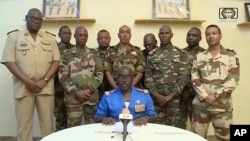When Gazali Mahaman Abdou heard about the military coup in his home country of Niger last July, he went to work reporting on developments.
A journalist for more than 20 years, Abdou reports for the German broadcaster Deutsche Welle from his base in Niger’s capital, Niamey.
But with a transitional military leadership in power, Abdou said, covering the situation has become too risky, with some journalists detained.
"Sometimes the menace is not coming from the junta directly but the supporters of the junta. That's why we are afraid,” he said. “Someone can attack you anywhere. That is why we're so careful. It's not easy.”
Some journalists left Niger because they couldn't work, Abdou said, adding, “After three or four months, they returned to the country, but they can't critique the junta directly."
Risky to report
Media advocates say that since the military coup that ousted President Mohamed Bazoum, journalists are at risk of arbitrary arrests and intimidation by transitional authorities.
In January, the junta suspended Niger's media association, known as the Maison de la Presse, replacing it with a committee headed by the Interior Ministry’s secretary general.
Abdou said journalists like himself who have stayed have changed how they report to ensure their safety.
"We’ve become more careful with our choice of words,” he said. “When I work, I know that the junta doesn't like to hear about the number of soldiers who died at the front line. We have to be more careful — we don't give the number, but the government number is not the good [correct] number."
It’s a situation that worries press freedom and rights advocates. Groups that include Amnesty International report Niger's transitional leaders are targeting and arbitrarily arresting journalists who report on the conflict and security-related topics.
Amnesty has called for the immediate release of journalists unjustly detained, including Soumana Maiga. Authorities detained the newspaper editor in April over a story about Russian agents allegedly installing listening equipment in state buildings.
Days before that arrest, authorities detained a journalist and former adviser to the ousted president.
A regional trend
Busola Ajibola, deputy director of the journalism program at the West Africa-focused Center for Journalism Innovation and Development, says the trend is concerning.
"When journalists are arrested arbitrarily and held incommunicado, it sends signals to other journalists to begin to self-censor,” she said. “That pattern is spreading not just in Niger but in places like Burkina Faso.
“What we worry about is not just the shrinking of the atmosphere for accountability journalism, but ... the total shrinking of the civic space," she said.
VOA’s attempts to reach the transitional government were unsuccessful. But the military has said that those journalists detained are accused of trying to undermine national security and destabilize the country.
In a tense environment, Ajibola said, media collaboration is one way for Niger’s journalists to get their stories out.
"This is the time we need to begin to advocate for regional collaboration among journalists themselves,” she said. “The government of Niger does not constitute a major threat to a journalist in Ghana, Mozambique or Nigeria, so we can now have a situation where journalists that are in Niger find a way to amplify their voices. They necessarily do not have to be the ones telling the stories, especially if they can't tell the stories within a safe zone."
Media watchdog Reporters Without Borders, or RSF, last year joined with 80 media groups and journalists to demand the military respect press freedom. But since the coup, Niger has dropped 19 points on the RSF World Press Freedom Index rankings.




